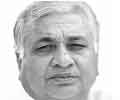Islam forbids spying as privacy is supreme
 Tabri, in his
History of Prophets and Kings, has narrated a case of adultery involving Mughira
bin Shuba, the governor of Basra during the time of Caliph Umar and a young
widow called umm Jamil. Sometime in AD 639, four Basra residents filed a
complaint with the Caliph accusing the governor of adultery. What provided
substance to the accusation was the fact that Mughira was a much married man,
who would have to divorce one of his wives to take a new one in order to stay
within the prescribed limit of four wives. -- By Arif M. Khan
Tabri, in his
History of Prophets and Kings, has narrated a case of adultery involving Mughira
bin Shuba, the governor of Basra during the time of Caliph Umar and a young
widow called umm Jamil. Sometime in AD 639, four Basra residents filed a
complaint with the Caliph accusing the governor of adultery. What provided
substance to the accusation was the fact that Mughira was a much married man,
who would have to divorce one of his wives to take a new one in order to stay
within the prescribed limit of four wives. -- By Arif M. Khan
By Arif M. Khan
Tabri,
in his History of Prophets and Kings, has narrated a case of adultery involving
Mughira bin Shuba, the governor of Basra during the time of Caliph Umar and a
young widow called umm Jamil. Sometime in AD 639, four Basra residents filed a
complaint with the Caliph accusing the governor of adultery. What provided
substance to the accusation was the fact that Mughira was a much married man,
who would have to divorce one of his wives to take a new one in order to stay
within the prescribed limit of four wives.
Many
Basra Muslims were critical of the governor’s conduct. Among them was one Abu
Bakra whose house faced the governor’s house. One day a strong wind blew open a
window in the house of Abu Bakra who was sitting with some friends. When he got
up to close it, he saw through the open window
of the house opposite, Mughira and the woman in a compromising position.
Abu Bakra called his friends to witness the governor involved with the
woman.
Soon
thereafter, Abu Bakra wrote to the Caliph, who promptly suspended Mughira,
appointed a new governor, Abu Musa Ashari, and summoned Mughira to Medina to
face trial. Abu Bakra and three other persons who claimed to be witnesses were
also summoned and formal judicial proceedings were
launched.
During
the trial, Mughira pleaded not guilty and insisted that the woman in question
was his wife and not Umm Jamil. Mughira averred with great indignation and force
that Abu Bakra and the others had no right to violate his privacy and spy on
him, he pleaded that personal privacy was an integral part of his dignity, which
is protected by the Quran
and Islamic laws. Abu Bakra, on the other hand, stood by his charge and
maintained that the woman with the governor was Umm Jamil. Three other witnesses
corroborated his statement, But a fourth witness, Ziyad, presented a confusing
picture by saying that he could not see the face of the woman and could not say
with certainty that it was Umm Jamil. During cross-examination the witnesses
were asked whether the woman had her back or her face towards them. They
admitted that the woman had her back towards them, but insisted that even from
her back she could be identified as Umm Jamil. They further referred to the
reputation of the governor to support their charge against
him.
Under
Quranic law, to press the charge of adultery the definite evidence of adultery
the definite evidence of four eyewitnesses is an absolute necessity. Since in
this case the witnesses claimed to have seen the woman from her back, the
evidence was considered weak, and since the fourth witness was not sure of the
identity of the woman, Mughira was given the benefit of doubt and duly
acquitted. The men who brought the charge against Mughira were punished as
provided in law.
Since
this case belongs to the early Islamic period, it has been commented upon by
many scholars. The overwhelming view is, what tilted the judgement in favour of
Mughira was not only the lack of definite evidence but the Quranic injunction
that prohibits any violation of the right to privacy of an individual. The Quran
says: “Enter not houses other than your own until you have asked permission and
saluted those in them... If you find no one in the house enter not until
permission is given to you: if you are asked to go back, go back, that makes for
greater purity for you” (24.27-28). This position is further reinforced by a
prophetic narration saying, “Asking for permission is allowed up to three times.
If it is not granted, you must return.” The Quran clearly forbids spying
(tajassus) and indulgence in suspicion and undercover activities that offend the
individual’s right to privacy. It says, “Avoid suspicion, for suspicion in some
cases is a sin: and spy not on each other nor (backbite) speak ill of each other
behind their back. Would any of you like to eat the flesh of his dead
brother?”
Strong
words, but that is how Islam upholds the individual’s right to privacy.
Source: The Sunday Guardian, New Delhi




 Sultan Shahin
Sultan Shahin


0 comments:
Post a Comment